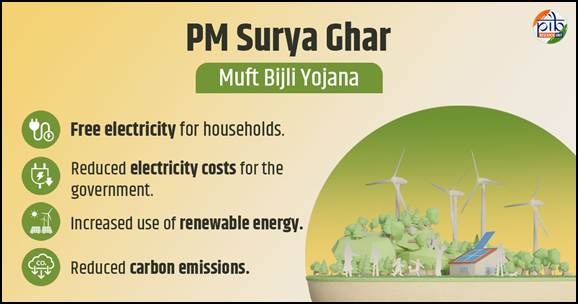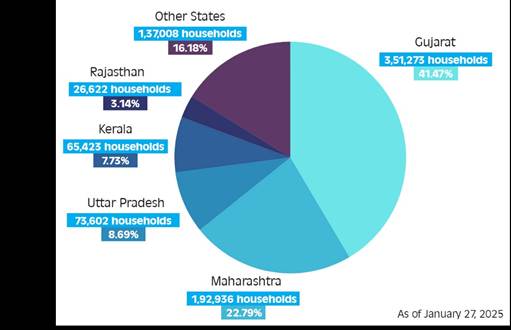
PM Surya Ghar: Muft Bijli Yojana (PMSGMBY), the world’s largest domestic rooftop solar initiative, has achieved a historic milestone with 10 lakh homes now solar-powered as of 10th March 2025.
Launched by Prime Minister Shri Narendra Modi on 13th February 2024, this transformative scheme is rapidly reshaping India’s energy landscape.
Every solar installation under PMSGMBY offsets carbon emissions equal to planting 100 trees, driving India towards a cleaner, greener, and self-reliant future.
Remarkable Progress Across Several States
The scheme has seen remarkable progress across several states. Chandigarh and Daman & Diu have achieved 100% of their government building rooftop solar targets, leading the nation in clean energy adoption.
States like Rajasthan, Maharashtra, Gujarat, and Tamil Nadu are also performing exceptionally well, contributing significantly to the overall installation figures. Government wants to ensure the smooth and timely execution of the scheme, with the goal of reaching 1 crore households by 2026-27.

Key Benefits
The PM Surya Ghar: Muft Bijli Yojana offers several significant benefits to participating households:
- Free Electricity for Households: The scheme provides households with free electricity through the installation of subsidized rooftop solar panels, significantly reducing their energy costs.
2. Reduced Electricity Costs for the Government: By promoting the widespread use of solar power, the scheme is expected to save the government an estimated ₹75,000 crore annually in electricity costs.
3. Increased Use of Renewable Energy: The scheme encourages the adoption of renewable energy sources, contributing to a more sustainable and environmentally friendly energy mix in India.
4. Reduced Carbon Emissions: The transition to solar energy under this scheme will help lower carbon emissions, supporting India’s commitment to reducing its carbon footprint.
Impact
The PM Surya Ghar: Muft Bijli Yojana is expected to have far-reaching outcomes, both for individual households and the nation as a whole:
- Household Savings and Income Generation: Households will benefit from significant savings on their electricity bills. Additionally, they will have the opportunity to earn extra income by selling surplus power generated by their rooftop solar systems to DISCOMs. For instance, a 3-kW system can generate over 300 units per month on average, providing a reliable source of energy and potential revenue.
2. Expansion of Solar Capacity: The scheme is projected to add 30 GW of solar capacity through rooftop installations in the residential sector, significantly contributing to India’s renewable energy goals.
3. Environmental Benefits: Over the 25-year lifetime of these rooftop systems, it is estimated that the scheme will generate 1000 BUs of electricity while reducing CO2 emissions by 720 million tonnes, making a substantial positive impact on the environment.
4. Job Creation: The scheme is also expected to create approximately 17 lakh direct jobs across various sectors, including manufacturing, logistics, supply chain, sales, installation, operations and maintenance (O&M), and other services, thereby boosting employment and economic growth in the country.
Aligned with the Aatmanirbhar Bharat initiative, the PM Surya Ghar: Muft Bijli Yojana supports domestic manufacturing by mandating the use of solar modules and cells produced in India.
As of 10th March 2025, the scheme has facilitated the installation of over 3 GW of rooftop solar capacity, with an additional 27 GW targeted by March 2027.
This initiative is also driving the local production of inverters and Balance of Plant (BoP) components, further strengthening India’s renewable energy ecosystem and enhancing the Make in India vision.
Conclusion
The PM Surya Ghar: Muft Bijli Yojana stands as a transformative initiative in India’s renewable energy journey, making solar power accessible, affordable, and impactful for millions of households.
With 10 lakh installations already completed, the scheme is well on track to achieve its ambitious goal of 1 crore solar-powered homes. By offering substantial subsidies, easy financing options, and a streamlined digital application process, the program ensures that households across urban and rural India can transition to clean energy with minimal financial burden.
Beyond reducing electricity costs, the scheme is fostering energy self-reliance, environmental sustainability, and economic growth, making it a key pillar in India’s clean energy transition.
Source: PIB

